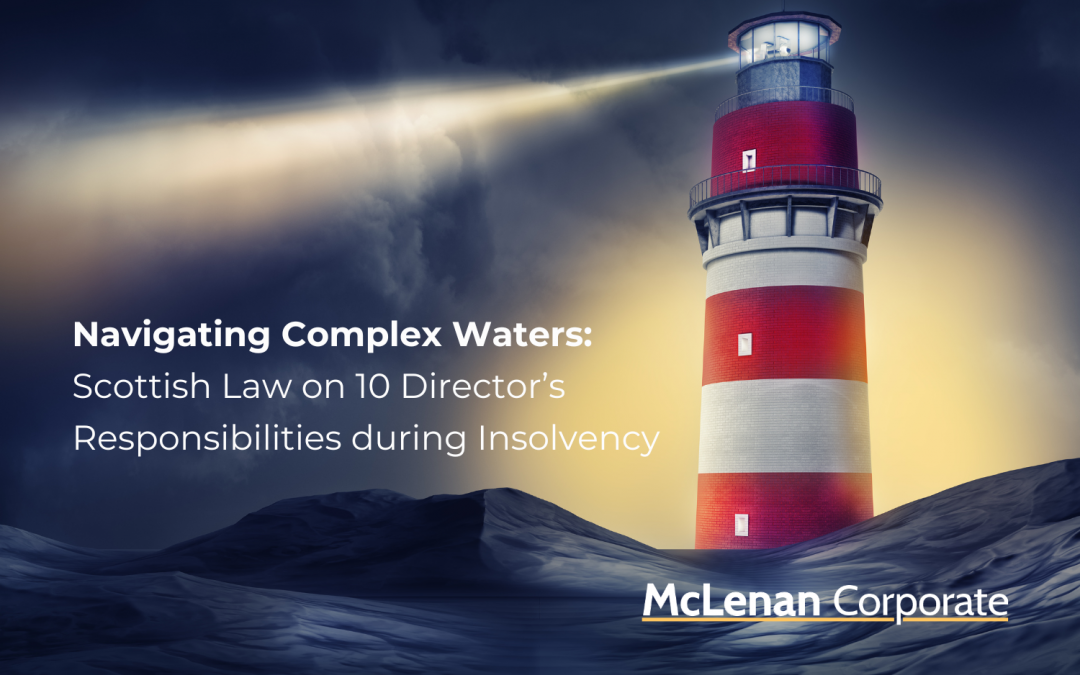For a director in Scotland, facing the murky waters of potential insolvency can be daunting. As the person at the helm of a company, certain responsibilities and duties are placed upon directors during insolvency proceedings. These duties are outlined in UK Company law, and any director operating in the UK must be well-versed in them.
Here, we’ll explore the obligations and potential pitfalls, shedding light on a director’s path during such challenging times.
1. Fiduciary Duties Intensify
While directors always have a duty to act in the best interests of the company, during insolvency, the interests of the creditors become paramount. This shift means directors must be exceptionally cautious in their financial dealings to ensure creditors are not disadvantaged.
2. Ceasing to Trade
If trading while insolvent worsens the position of creditors, directors may be held personally liable for the company’s debts. In Scotland, wrongful trading provisions can be invoked, and directors could face legal consequences if they knowingly allow the company to incur further debts without a reasonable prospect of payment.
3. Avoidance of Preferences and Transactions at Under Value (TUV)
Directors must avoid showing preference to certain creditors or disposing of company assets at less than market value. Scottish insolvency law is stringent on this to ensure fairness to all creditors.
4. Duty to Cooperate with the Insolvency Practitioner
Once an insolvency practitioner (IP) is appointed, directors have a legal duty to cooperate fully. This includes providing all necessary information about the company’s affairs, assets, and liabilities. Any attempt to withhold information could lead to legal repercussions.
5. Director Disqualification
Directors who fail to uphold their responsibilities during insolvency risk being disqualified from acting as a director for up to 15 years. This is a serious consequence that underscores the importance of adhering to legal obligations.
6. Personal Guarantees Come to the Fore
Many directors in Scotland offer personal guarantees to secure business loans. During insolvency, these guarantees may be called upon, meaning directors could face personal financial repercussions.
7. Moratorium on Legal Actions
While not a duty, it’s crucial for directors to understand that when a company enters administration in Scotland, there’s an immediate freeze on most legal actions against the company. This provides a breathing space, allowing the company and the Insolvency Practitioner time to develop a strategy to rescue the business.
8. Responsibility to Notify Relevant Parties
On realising that insolvency is unavoidable, directors have a duty to notify certain parties. This includes employees, shareholders, and all known creditors, ensuring they’re aware of the company’s position.
9. Duty to Minimise Potential Losses
Directors must act diligently to minimise losses to creditors. This could involve cost-cutting, restructuring, or seeking out professional advice at the earliest signs of financial distress.
10. Maintaining Accurate Records
It’s imperative to keep accurate financial records and ensure they’re up-to-date, especially when insolvency looms. Inaccurate records can complicate insolvency proceedings and can lead to accusations of wrongful trading or misfeasance against directors.
In Summary
While the challenges of navigating insolvency in Scotland are many, understanding one’s duties as a director is paramount. By adhering to the legal responsibilities and seeking timely advice, directors can ensure they act ethically, transparently, and in the best interests of all stakeholders. In the complex waters of insolvency, knowledge truly is the director’s compass.

